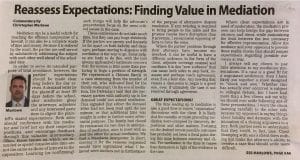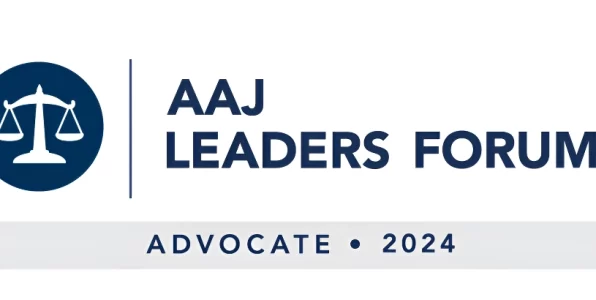The Daily Business Review recently published a guest article written by The Haggard Law Firm’s Christopher Marlowe on mediation. Marlowe’s article, Reassess Expectations: Finding Value in Mediation was included as part of DBR’s special section on arbitration and mediation published November 16th, 2016.
The full article: Reassess Expectations: Finding Value in Mediation By Christopher Marlowe
Mediation can be a useful vehicle for reaching the efficient compromise of a lawsuit. It can also be a complete waste of time and money. Because it is ordered by the court, the parties are well served by substantively addressing the subject with each other well ahead of the scheduled date.
In order to serve its intended purpose of trial avoidance, however, the parties’ expectations should be made clear long before the day arrives. A demand letter by the plaintiff at least 30 days before the scheduled mediation gives the attorneys, adjusters and any interested party time to digest the plaintiff’s stated expectations. Both sides should conference with the mediator and brief her on their respective positions, and encourage feedback through this valuable intermediary. Often, those issues on which we intended to spend considerable time are not the same as those of interest to the opposition. Learning (or confirming) such things will help the advocate’s presentation focus on the most critical issues in the case.
These conferences do not take much time, but they can pay huge dividends. If the parties are openly and honestly so far apart on both liability and damages, perhaps moving to dispense with mediation is the way to go. Some judges are loath to do this, with the (not always unfounded) legitimate concern that the motion is little more than posturing to feign a position of strength. We represented a Chinese family in a case stemming from the murder of their son, who delivered food for the family restaurant. On the eve of mediation, the Defendant said that the necessary parties with authority up to the demand could not attend mediation. This signaled that either the demand letter had not been read until the last minute, or that additional time was sought in order to further some adversarial purpose. The family had closed its restaurant for two days in anticipation of mediation, once to meet with us and the other for actual mediation. We had a Mandarin interpreter. In short, moving it for the reasons requested would have legitimized what I believed were motives not in furtherance of the purpose of alternative dispute resolution. If arm twisting is required to bring people to the table and the process causes more disruption than it prevents, I recommend opposing efforts to force the issue.
Where the parties’ positions through their attorneys have become entrenched, it can be useful to have a different audience, in the form of the client, adjuster, coverage counsel and mediator. It is this “new audience” that can cause both sides to step back, reassess and perhaps reach agreement, even if on a later date. Any meeting that causes a discussion to begin is a good one, even if ultimately the case is not resolved through agreement.
Great Expectations?
The time leading up to mediation is also a good time to renew “expectation” discussions with the client. It is likely that the months or more preceding mediation were occupied by discovery, depositions and other matters. Focusing on the desired versus possible outcomes has probably not been a focal point during this time between attorney and client. Pre-mediation is the time to renew that discussion in light of the evidence in the case.
Where client expectations are in need of moderation, the mediation process can help bridge the gap between attorney and client, while maintaining the trust between the two necessary for effective representation. Allow the mediator and your opponent to provide those reality checks that should temper expectations regarding possible outcomes at trial.
I always tell my clients to pay little attention to my mediation presentations. If a case is a good fit for a negotiated settlement, then I have likely put together a show designed to “shock and awe.” Whether this has actually ever occurred is subject to collegial debate, but I have had more than a few clients ask me why we should ever settle following one of these presentations. I want the client listening carefully to the other side because my opponent is saying things about liability and damages with the intonation of a closing argument to a jury. Both parties need to understand that they could, in fact, lose. Chest thumping with one’s client does nothing but make the attorney’s ability to resolve a case that should settle more difficult.
Trial practice is inherently, and necessarily, adversarial. Bringing parties to a lawsuit into the ring for a truce may feel like bringing two boxers to agree to a draw before round one in order to prevent either side from losing. The concept is a tough sell. We all want to win. That desire need not be tempered simply by engaging in the mediation process. Working hard to achieve a negotiated settlement is not a sign of weakness but rather a professional recognition of the duty to care for a client’s best interests in light of all possible scenarios.
As with most life issues, the mediation process benefits from communication. Conflicts in the evidence, disagreements that go unsaid, expectations that are not expressed, all of these will come to the fore eventually. As long as everyone is assembled for mediation, there is no point in holding back these issues and surprising the other side at a time and place unlikely to give anyone the necessary time to adjust. You may end up settling, and you may not. But whatever the outcome, it will not have been a waste of time.
TO EAD ARTICLE AS IT APPEARS IN THE DAILY BUSINESS REVIEW: http://www.dailybusinessreview.com/id=1202772630098/Reassess-Expectations-Finding-Value-in-Mediation?kw=Reassess%20Expectations:%20Finding%20Value%20in%20Mediation&et=editorial&bu=Daily%20Business%20Review&cn=20161121&src=EMC-Email&pt=Special%20Report&slreturn=20161021113109











